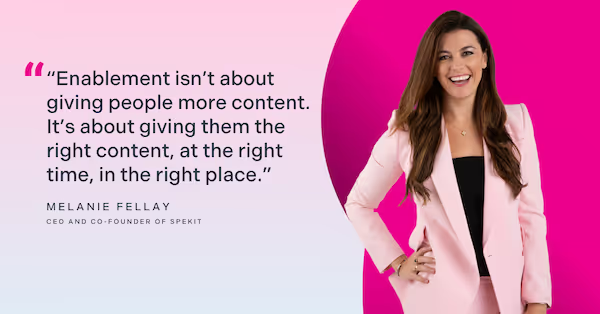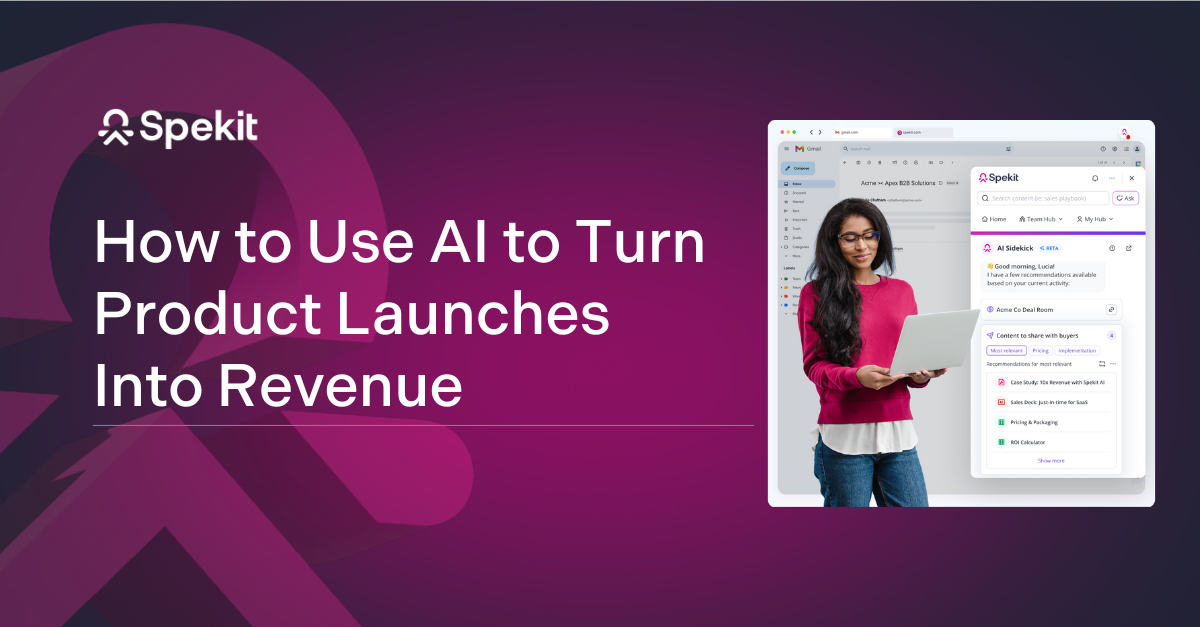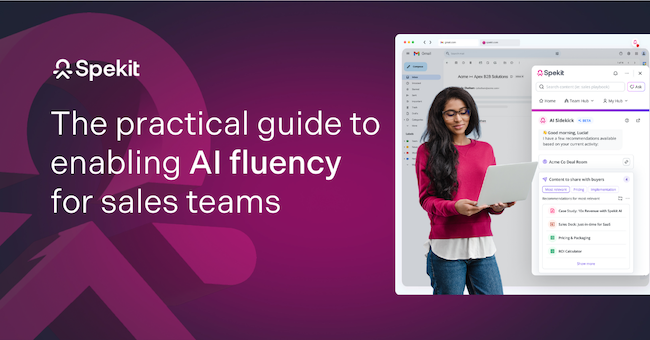In an era defined by constant disruption, where AI is reshaping workflows and product updates are released daily rather than quarterly, enablement has reached an inflection point. The old models of training—long-form onboarding sessions, clunky LMS platforms, and once-a-quarter refreshes—can’t keep pace with the rate of change.
This was the core message of Melanie Fellay’s recent webinar on her book Just-In-Time: The Future of Enablement in a World of AI, a sharp and deeply personal reflection on where enablement is today, and where it needs to go.
It wasn’t just a product talk. It was a narrative—eight years in the making—about how enablement must evolve to meet the needs of today’s revenue teams. It called for a rethink of how we deliver knowledge, train teams, and help reps keep up in a world where complexity is accelerating.
“Change is happening faster—not just in your business, but in your industry, your buyers, and how they operate.”
From solo journaling to a full-on movement
Melanie didn’t set out to write a book. Like many great ideas, this one started on a solo trip to the Colorado mountains. Amid quiet reflection, she started writing about how work is changing, how enablement has failed to keep up, and what it could look like to fix it. What started as journaling turned into 56 pages of raw insight.

She shared it with a few trusted friends. The response? "This needs to be a book."
That’s how Just-In-Time: The Future of Enablement in a World of AI was born. Not as a marketing asset, but as a deep response to a workplace challenge every revenue leader is feeling: how do we enable teams to move faster, with less friction, in the face of constant change?
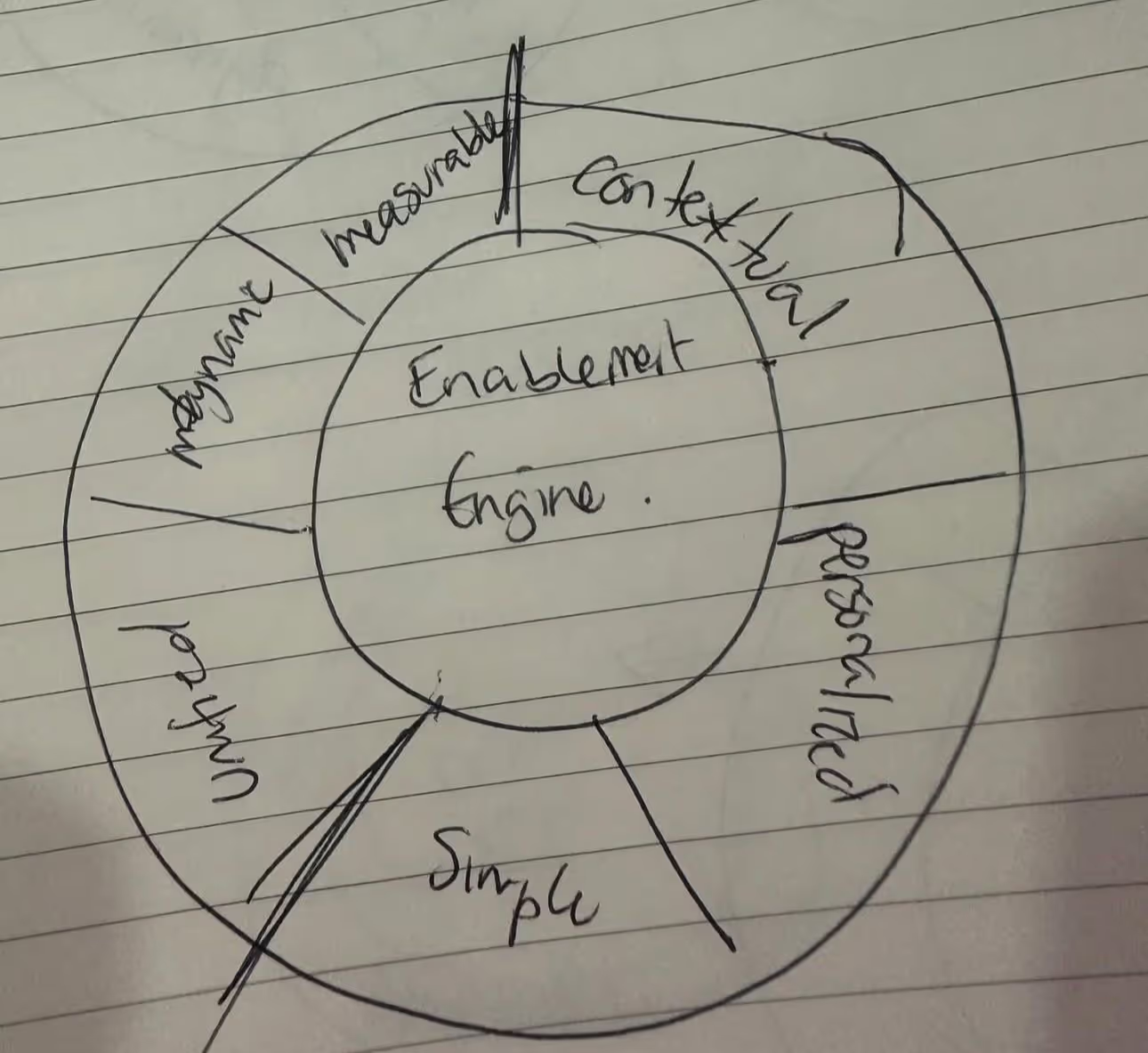
Why speed is your real advantage
One of the clearest takeaways from Melanie’s talk: speed is no longer a nice-to-have. It is the advantage.
"The majority of sales reps don’t expect to meet quota. In that environment, speed isn't just a differentiator—it’s survival."
The webinar shared examples of companies like ZoomInfo and Equifax who dramatically improved outcomes by bringing enablement closer to the moment of action. Not by adding more content. But by delivering knowledge when and where it’s needed.
At ZoomInfo, reps were missing key steps in the prospecting process, letting pipeline slip through the cracks. With just-in-time enablement, they were able to recapture that lost value by embedding the right guidance directly into rep workflows.
Equifax, a company more than a century old, reduced both ramp time and average handling time by surfacing answers and process guidance at the exact moment their reps needed it.
The common thread? Frictionless access to knowledge. That’s the heart of just-in-time enablement.
The old playbooks are breaking
Melanie backed up her thesis with hard data. In a recent Spekit and SEC survey, 55% of respondents cited low adoption by reps as the primary reason for switching platforms. And 92% of teams said that less than 60% of their content is actually being used.
Think about that: enablement teams are creating content around the clock, but most of it never sees the light of day. Why? Because it’s not accessible. It’s buried in folders. It’s irrelevant to the moment the rep is in.
"We’ve accepted that reps won’t use our content. We shouldn’t."
There’s a real cost here. Hours are spent weekly by enablement professionals administering platforms—not creating impact, but tagging documents and building folder structures no one visits.
The solution isn’t more features. It’s a fundamental rethink of the system.
The future of enablement is contextual
Melanie is clear: learning must happen in the flow of work. That’s not a buzzword—it’s neuroscience.
When learning is disconnected from doing, retention drops. Contextual learning—delivered at the precise moment of need—leads to better memory, faster application, and more confident action.
Gartner research confirms it: sellers enabled just-in-time are 2.5x more likely to exceed revenue goals.
The best enablement is invisible. It shows up in the tools your team is already using. It guides reps in the moment, without requiring them to switch tabs, search through Notion pages, or ask a peer.
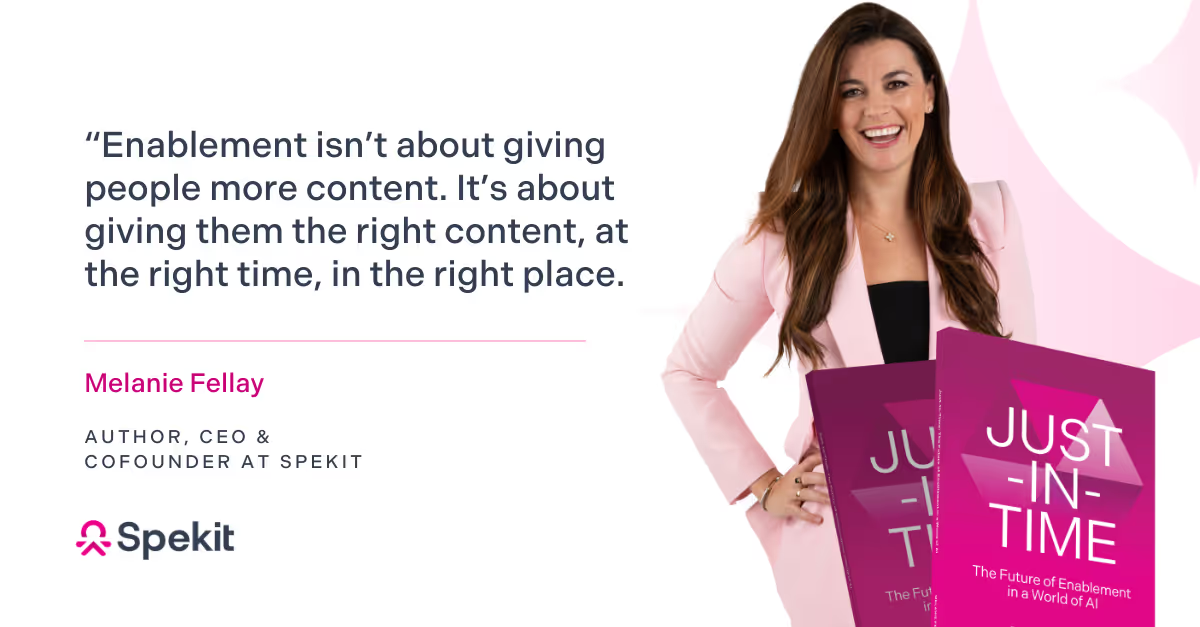
It’s also personalized
Two reps can start on the same day, attend the same training, and still face entirely different journeys. That’s why enablement must adapt to the individual.
With AI, that’s no longer a pipe dream. Just-in-time enablement powered by AI can detect context—deal stage, persona, previous interactions—and serve the most relevant content in real-time.
This is more than a productivity win. It’s a shift toward treating reps as unique humans with unique learning curves, not just cogs in a training machine.
Simplicity is strategy
One of the most overlooked truths in enablement: complexity kills adoption.
“Your reps aren’t lazy. They’re busy.”
In our personal lives, we expect software to be intuitive and instant. But at work, we tolerate clunky portals and 10-click workflows.
That’s unsustainable.
The future of enablement requires tools and content that feel as easy as Spotify, as responsive as ChatGPT, and as simple as sending a text. Melanie draws from the science of habit formation to stress that design matters—not just in the UI, but in how behavior is shaped.
If the experience doesn’t feel effortless, it won’t scale.
Content decay is the silent killer
Perhaps the most urgent problem Melanie raises is content decay.
Content doesn’t stay fresh on its own. And today, reps don’t trust it—only 35% say they believe the data they’re seeing is accurate. That undermines everything.
Most platforms rely on expiration dates, manual review processes, and admin alerts. These don’t work. The solution lies in dynamic content: systems that connect to your source of truth, listen for changes (like new competitors or pricing updates), and auto-suggest revisions.
It’s a whole new model for governance. And it’s critical.
"The content decay problem, if unsolved, will become the biggest blocker to scaling accurate, AI-powered enablement."
Rethinking content altogether
Melanie offers a powerful metaphor: playlists.
In Spotify, one song can appear in multiple playlists. The order can change. The vibe can shift. That same logic, she argues, should apply to enablement content.
Today, our knowledge lives in rigid documents, locked inside folders. It’s hard to find, hard to update, and impossible to repurpose. That must change.
Just-in-time enablement breaks up long documents into modular, reusable pieces that can surface wherever they’re needed. Battle cards, onboarding modules, talk tracks—all built from the same source, shown in different ways.
That’s how we scale without creating duplicate work.
The measurement mindset
Finally, Melanie challenges the illusion of ROI in traditional enablement. Page views don’t equal impact. Course completion doesn’t equal readiness.
Real impact is behavior change. Did the rep use the content when it mattered? Did it change how they showed up on the call? Did it move the deal?
Just-in-time systems can track this, because they live inside the workflow. You can see who used the battle card before the meeting—and who ignored it. That’s insight you can act on.
Enablement can’t just be about activity. It has to be about outcomes.
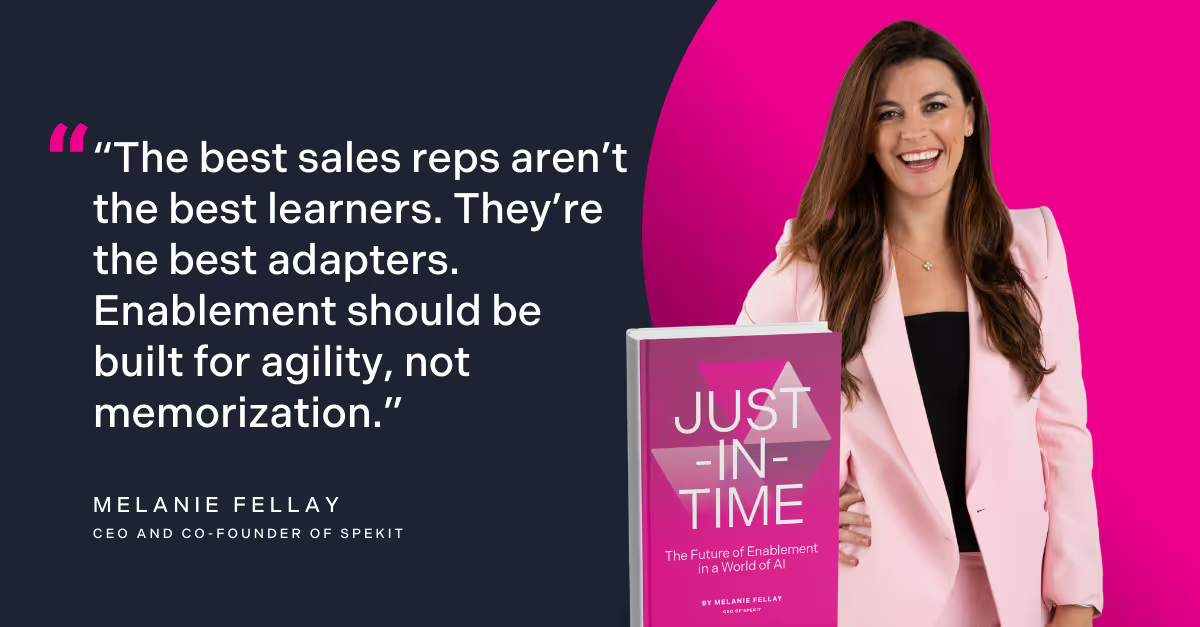
This book isn’t just for enablement leaders. It’s for anyone navigating change.
If you work in sales, customer success, operations, or marketing—this book will challenge how you think about knowledge, communication, and scale.
If you lead a team, it will give you a new model for helping people keep up with change.
If you’re tired of the chaos—of creating docs that no one reads, of managing systems no one uses, of seeing reps struggle with basic processes—this is your call to rethink everything.
Watch the full webinar here:
Order your free copy of Just-In-Time: The Future of Enablement in a World of AI
This isn’t a typical business book. It’s a sharp, systems-level view of how the modern workplace works—and how it can work better.
Whether you want to level up your enablement strategy, rethink your content systems, or better support your go-to-market teams, this book is your starting point.
Get your free copy at justintimeenablement.com
Because enablement isn’t a department. It’s a design challenge. And the future belongs to those who solve it.

